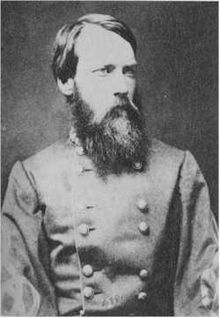General Turned Chemist
Another installment of the series “Tales from the Tombstone”
Born in Fredericksburg, Virginia on September 8, 1829, Seth Maxwell Barton had one of the unique post-Civil War careers out of any of the former Confederate general officers. He became a noted and renowned chemist.
Which was probably reminiscent of his Confederate service, as it was a mix of different commands, like elements, that never quite worked out. Okay, maybe the comparison of chemist to general was a bit of a stretch, but it was worth a shot?

After following the traditional route of pre-war general officers, Barton graduated from West Point, where he actually entered at the young age of 15. Graduating in 1849, he saw extensive service on the frontier; mostly in newly acquired American territory of New Mexico and the state of Texas. By the outbreak of hostilities he was a captain in the United States Army.
Barton resigned his commission and due to being posted in the west, made it to Arkansas, where he was elected lieutenant colonel in the 3rd Arkansas Infantry. He came east with the command and served in the 1861 campaigns in what is now West Virginia.
Promoted to brigadier general on March 11, 1862, Barton headed west, first to eastern Tennessee and then to the division of Carter Stevenson in John Pemberton’s Army of Mississippi.
At the Battle of Champion Hill, as Grant moved toward Vicksburg, his brigade fought valiantly but was overwhelmed. Regrouped, Barton continued in command and was surrendered with the rest of Pemberton’s command on July 4, 1863.
Exchanged, Barton took command of Lewis Armistead’s Brigade and Barton held command in North Carolina, where he ran afoul of George Pickett during the operations against New Bern. He then was transferred back to Virginia, where he once again ran afoul of a commanding officer and was removed a second time from command. The charges both times were on not providing the necessary assistance or cooperation to other engaged Confederate units.
Yet, Barton was given another shot in the eastern theater as influential fellow officers vouched on his behalf. Assigned to a brigade in the defenses of Richmond, Barton stayed in command until the evacuation. At Sailor’s Creek on April 6, 1865, Barton was one of the nine Confederate officers captured.
Barton than endured three months captivity at Fort Warren in Boston Harbor before he took a loyalty oath and went home.
He started the practice of chemistry in his hometown of Fredericksburg and by the turn of the century was one of the most prominent chemists in the United States.
What was supposed to be a social visit at his son’s house took a drastic and sorrowful turn when Barton died suddenly and unexpectedly. He was 70 years old. Although he perished in the nation’s capital, Barton was laid to rest in the City Cemetery of Fredericksburg.
